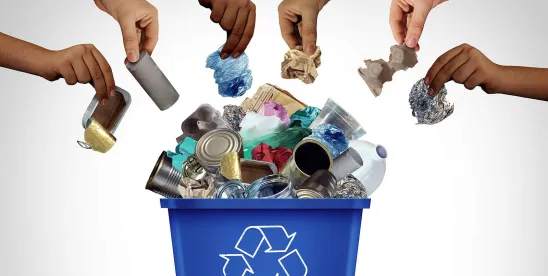In November 2023, a collection of consumer protection organisations from across the European Union reported several major bottled drinks companies to the European Commission and consumer protection authorities (CPA Network) for misleading recycling claims on their bottles. Following the complaint, a global drinks company has voluntarily offered to make a series of changes to the recycling claims on its plastic bottles.
This alert considers the concerns raised with the recycling claims and how they are being addressed by the company.
As shown by this case, the threat of “greenwashing” allegations carrying real legal risk has accelerated in the last 24 months, despite some flux in the EU legislation. Particularly at the national level, global brands face a potential slew of complaints from competitors and consumer bodies presenting serious financial and operational consequences.
Striking the perfect balance between being accurate and transparent with claims, whilst avoiding information overload for the consumer and fitting onto the narrow packaging “landscape” in an aesthetically pleasing way poses a challenge.
As brands embark on this steep learning curve, marketing and legal teams can take valuable notes and guidance from cases such as this one.
The Complaint and Issues Raised With the Claims on the Bottles
The joint complaint was brought by the European Consumer Organisation (BEUC)—the umbrella group for 45 independent consumer organisations from 32 countries—together with member organisations from 13 EU countries, in collaboration with ClientEarth and Environmental Coalition on Standards, an international nongovernmental organisation with a network of members and experts advocating for environmentally friendly technical standards, policies, and laws.
The complaint highlighted three main areas of concern with the bottlers’ claims:
- First, the use of the term “100% recyclable,” because the recyclability of the bottle depends on many factors such as the available infrastructure to collect materials, the effectiveness of the sorting process, or appropriate recycling processes.
- Second, the term “100% recycled,” since it wrongly implies that the full bottle is made entirely from recycled materials whilst it is a widespread practice to add nonrecycled plastics to the body of a bottle.
- Third, the use of “green” imagery such as green logos or nature images, which can falsely imply environmental neutrality and perpetual plastic circularity, or even give the impression that the bottles would have a positive impact on the environment.
The BEUC alleged that they consider these environmental claims to be highly misleading and to infringe applicable EU legislation.
Proposed Fixes to the Claims
Following the complaint, one major group identified in BEUC’s complaint voluntarily engaged with the CPA Network and publicly committed to:
- Substitute claims on its bottles’ labels such as “I am a bottle made from 100% recycled plastic” with clearer statements such as “This bottle, excluding label and cap, is made from 100% recycled plastic”;
- Replace claims on its bottles’ labels such as “Recycle me again” with “Recycle me” to make it clearer to consumers that that there is no closed loop in the recycling process;
- Ensure that the overall impression of the labelling and marketing of its bottled drinks is not misleading consumers as to the environmental benefits of the packaging; and
- Ensure that digital marketing campaigns on the company’s websites and social media channels reflect the content of the commitments.
We would expect at least some of the other companies identified in the complaint to follow suit.
Come Clean With Your Advertising—Key Takeaways to be EU Law Compliant
Ask yourself:
- Do we have good processes in place for preparing, reviewing, and approving sustainability claims on our packaging and marketing? For example:
- Training for staff involved in product design, marketing, packaging procurement, and communications;
- Clear playbooks, including on risky or no-go terms, tailored to the company’s approach (which can be by geographic market or a one-size-fits-all approach if the same packaging is used globally); and
- A formal cross-department review and sign-off process, ideally including representatives from the company’s sustainability and legal teams (if any).
- Are we using clear and unambiguous language in our environmental claims, or could it be regarded as vague or risk giving a consumer a misleading impression?
- Do we have solid factual evidence backing up the claims we are making (e.g. certifications, third party audits, recyclability data, etc.)?







 />i
/>i
